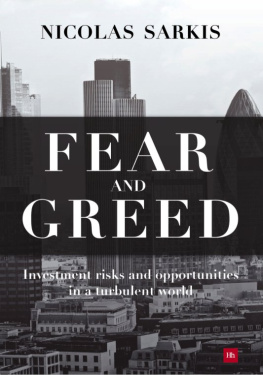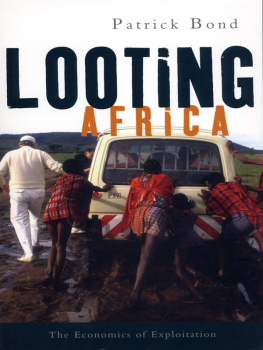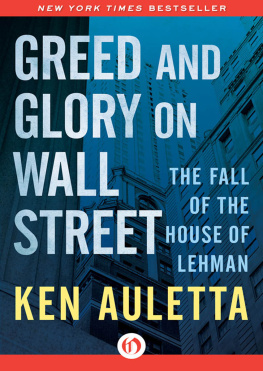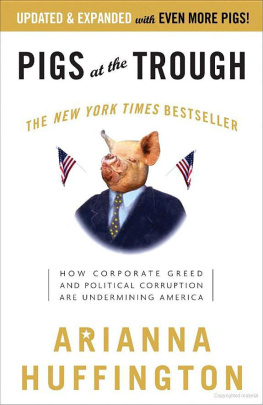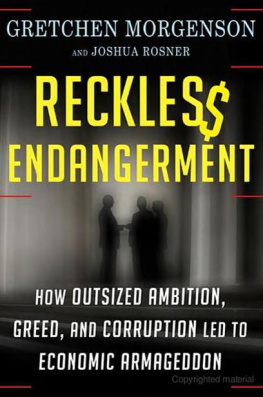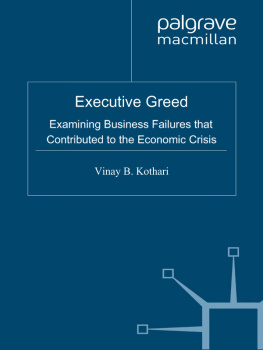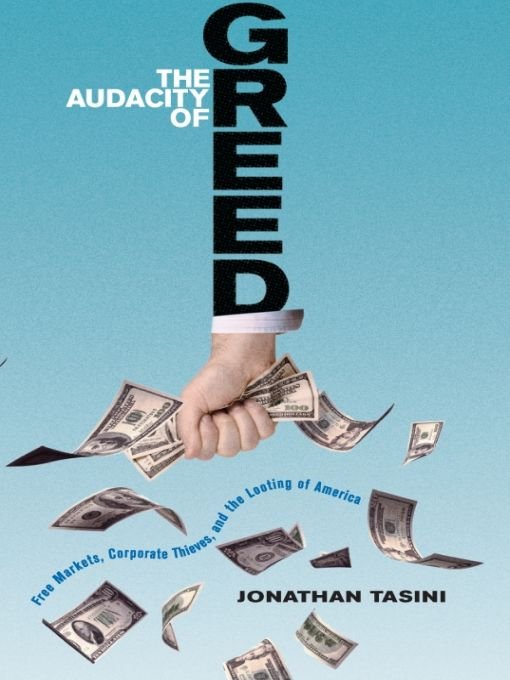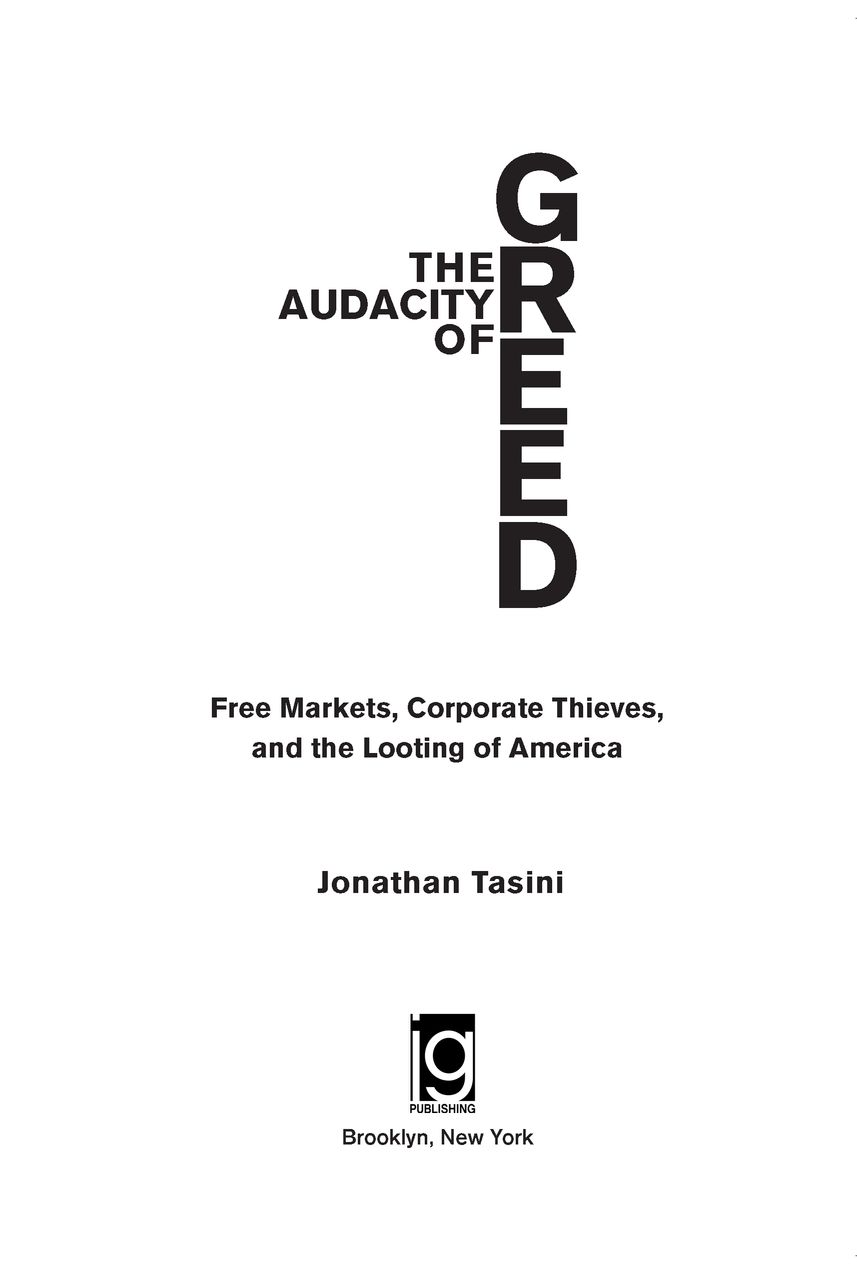Table of Contents
For my father, who would have been disgusted by the greed.
Introduction: Highway Robbery
The United States of America has just lived through the greatest looting of money in its history, a vast robbery that began in the late 1970s and has stretched to the present day. The perpetrators of this grand robbery didnt just steal a few possessions, or a little bit of cash. Instead, they drained the economy of trillions of dollars, in the process skulking off with a vast fortune that defied imagination while leaving millions of people without jobs, in poverty or without their life savings.
It wasnt a Willie Sutton kind of robbery, with guns drawn and a slip of paper passed to a bank teller. Sutton, you may recall, was a notorious bank robber who lives on in the public imagination because of a one-sentence answer he gave to explain his particular strategy of making money. When asked why he robbed banks, he supposedly replied (supposedly because he later denied ever uttering this memorable phrase), Because thats where the money is. Since Willie was usually well-armed when he committed his crimes, his actions fit well with the classic definition of a robbery, which Merriam-Websters Dictionary tells us is larceny from the person or presence of another by violence or threat.
No, the robbery I am speaking about was pulled off without a single bullet being fired, and was, for the most part, perfectly legal (though many of the perpetrators actions spilled over into illegality). It was actually more like highway robbery, which Merriam-Websters defines as excessive profit or advantage derived from a business transaction. You have probably heard of some of the people involved in this highway robberyBernard Ebbers, John Rigas, Dennis Kozlowski, Edward Whitacre, Douglas Conant, John Thain, Jeffrey Kindler and David Farr, to name but a few. What do these people all have in common? They are, or were, corporate CEOs.
Over the past few decades, a small group of corporate executives, running mostly American-based companies, have carted off hundreds of billions of dollarsand stand to earn even more riches thanks to incredible pensions. With few exceptions, none of this cadre of executive officers used violence or physical threats (certainly not explicit, documented physical threats) to pull off a systematic looting scheme that is staggering in its scale and breadth across our economy. Instead, with the support of a vast array of accomplicesincluding academics, media talking heads and politicians across the ideological spectrum, who together helped create the myth of the great CEO, who, as the rap went, had to be paid vast amounts of money because he created so much value for both his company and the economypulled off the largest confidence scheme in this countrys history.
This great robbery was ideologically enabled by a three decades-long flogging of a worldview that we now know is entirely bankrupt: that our societys well-being is governed by the free market. The constant rhetorical praise, in newspapers, on TV and by politicians of both parties, of free market ideologyor market fundamentalismallowed for public acceptance of the robbery, as people were told that the great riches of the CEO were part of the American system of free enterprise, and if they worked hard and played by the rules, they too would one day become wealthy. Ultimately, the free market myth went, we are all part of the big picture of endless American prosperity.
Instead of being based on any kind of sound economic theory, the free market was in reality nothing more than a marketing phrase, used to cover up the relentless plundering of our countrys prosperity, which was in turn funneled into a small number of hands, creating the deepest divide between rich and poor in more than a century. Look at the numbers; in 2005, the average Chief Executive Officer in the U.S. was paid 821 times as much as a minimum wage earner. Or to put another waythe average CEO earned more before lunchtime on his very first day of work than a minimum wage worker earned during the entire year. And, in a further sign of how audacious the greed of these corporate elites was, at the same time that CEOs were jetting off in their G-5 corporate jets and plunking down $20 million for lavish New York City apartments, workers at their companies were being asked to sacrificeeither by taking a hit in their paychecks, or by being forced to pick up more of their health care costs (or maybe even losing health care all together), all the while looking down the road at the bleak prospects of spending their retirement years without a real pension.
While, on occasionespecially when the excesses or criminal activities of one of the CEOs would be splashed across the headlinesfor the most part, the totality of the amount of money these corporate elites took was, until recently, not well understood, nor was the great damage their robbery did to individual companies, the economy as a whole and, most importantly, individual workers. This book tries to capture the overall scale of the robbery, to look at how it was was undertaken and justified, as well as to explain how we can make sure it stops.
Greed is GoodFor A Few
I actually began thinking about writing this book before the crash and burn of the financial industry in September 2008, when the world finally discovered that the poster boys for the new Gilded Age, a group of modern day Robber Barons who had pocketed large fortunes, puffing up their egos and their bank accounts largely by piling up huge mountains of debt for their companies, were really little boys with matches who ignited a global economic crisis, obliterating trillions of dollars in wealth in a matter of months.
Lets be clear: greed is the precise reason that millions of people are suffering now and will suffer for years to come. If the CEOs knew one thing, it was how to do their math: the more their companys stock went up or the more cash they could hoard to increase profits, the more their personal fortunes would skyrocket, either because of rich stock options or the personal stakes they held in their companies. Because of greed, many CEOs abandoned basic, sound business practices, building a mountain of debt on pure speculation and inflation of assets. Yes, some wound up losing money, and a few lost great fortunes because of their schemes. But mostly the sky fell in for ordinary people, as millions of jobs were vaporized, with millions more likely to disappear over the next few years; retirement funds, cobbled together over years by people who put off immediate gratification so they could kick back in their golden years, shriveled up.
Like a lot of Americans, I knew the individual storiesthe $6,000 shower curtain purchased by Tyco CEO Dennis Kozlowski, the $70 million bonus check for Goldman Sachs Lloyd Blankfein, the crimes committed by Ken Lay and his cohorts at Enron. But, it wasnt until a Sunday morning in early April 2008 that the enormity of the robbery was really driven home to me. On that day, the business section of The New York Times published its annual report on executive pay. There, spread across two full pages, were the salaries, benefits and accumulated wealth of 200 chief executives of large public companies that had filed their proxy statements by the end of the previous month.
As I went down the list, my finger kept stopping at an entry here, an entry there. Total value of equity holdings read one column $137 million, $122 million, $42 million. The CEO of Occidental Petroluem, Ray Irani, had pulled in $33.6 million in salary and bonuses in 2007 while also adding millions more to his stock option fortune to bring his total equity holdings in the company to $676 million. John Finnegan, the CEO of Chubb, had pocketed almost $13 million in compensation and boosted his total equity holdings to $42.6 million; his competitor at MetLife, C. Robert Henrickson, had taken home even more in compensation, $14.2 million, with equity holdings of $25 million, all on top of a lump sum retirement pension of $23.3 million (up to that point).


